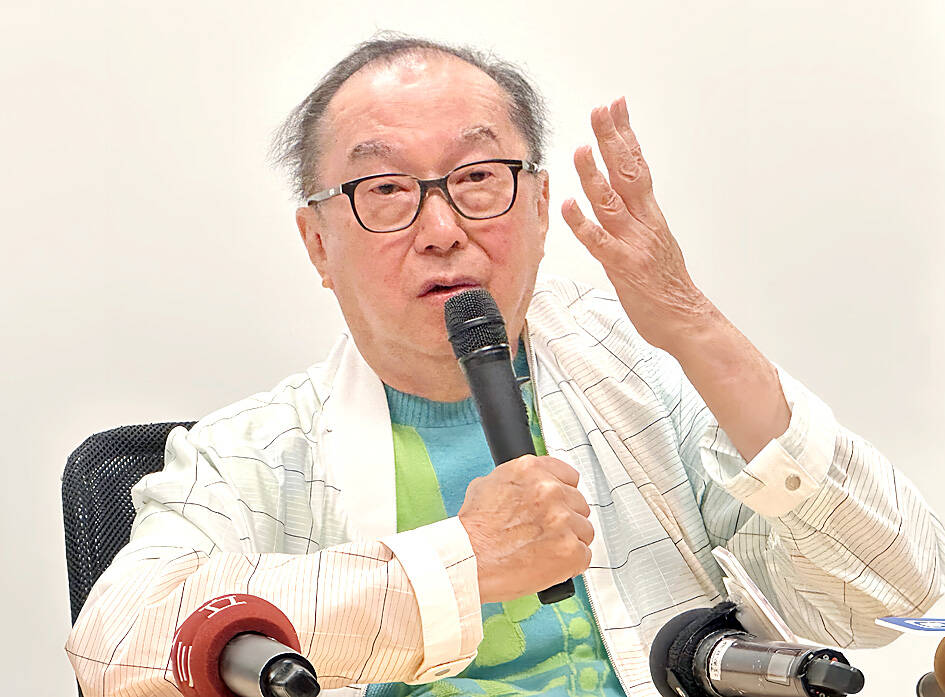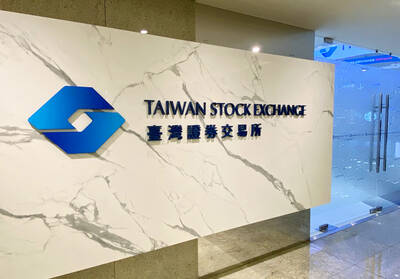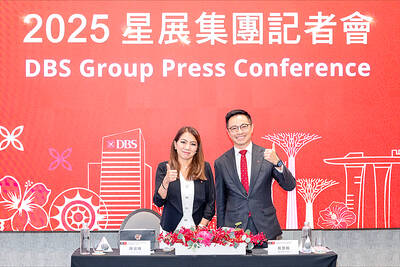The combined wealth of Taiwan’s top 50 billionaires rose 12.23 percent in a year amid an artificial intelligence (AI) boom, with Barry Lam (林百里), chairman of AI server maker Quanta Computer Inc (廣達), taking the top spot for the first time, according to Forbes.
After increasing at a modest pace of 1.3 percent last year, Taiwan’s economy rose 6.5 percent in the first quarter of this year, the fastest growth in almost three years, due to an increase in exports related to solid global demand for AI applications, Forbes said.
The TAIEX has also increased by about one-third since the magazine last measured it 14 months ago, Forbes said.

Photo: Fang Wei-chieh, Taipei Times
Meanwhile, the combined net worth of the top 50 richest people in Taiwan rose to US$174 billion from US$155 billion, it said.
Lam’s net worth more than doubled to US$11.7 billion, the highest among the top 50 richest people in Taiwan, after his company’s share price surged to record highs over the past year, putting him at the top of the list for the first time.
Forbes said that Quanta’s net profit jumped by more than one-third to US$1.2 billion last year after it began providing products such as notebook computers and AI servers to clients such as Apple Inc and Google.
Quanta’s performance also helped company vice chairman and president C.C. Leung (梁次震) earn a spot on Taiwan’s top 50 richest people list for the first time.
He was ranked No. 42 with a net worth of US$1.45 billion, Forbes said.
Brothers Daniel Tsai (蔡明忠) and Richard Tsai (蔡明興) from financial conglomerate Fubon Group (富邦集團) took second place this year, down from the top spot last year.
Their net worth rose 22 percent to US$10.7 billion partly due to their investments in biotech venture capital firm Diamond Biofund Inc (鑽石生技), which went public in September last year.
Also boosted by the AI frenzy, Terry Gou (郭台銘), founder of Hon Hai Precision Industry Co (鴻海精密), the world’s largest contract electronics maker, saw his net worth rise by US$3 billion to US$10.4 billion, boosting his ranking from No. 6 to No. 3.
In fourth, self-made footwear tycoon Zhang Congyuan (張聰淵), who founded shoe manufacturer Huali Industrial Group Co Ltd (華利集團) in 2004 and now runs factories in China, Vietnam and the Dominican Republic, recorded a net worth of US$10.1 billion.
Brothers Tsai Hong-tu (蔡宏圖) and Tsai Cheng-ta (蔡政達) from financial conglomerate Lin Yuan Group (霖園集團) placed fifth with a net worth of US$9.3 billion, while brothers Jason Chang (張虔生) and Richard Chang (張洪本), who run the world’s largest IC packaging and testing service company, ASE Technology Holding Co (日月光投控), ranked sixth with a net worth of US$7.8 billion.
The four Wei brothers — Wei Ing-chou (魏應州), Wei Ying-chiao (魏應交), Wei Yin-chun (魏應充) and Wei Yin-heng (魏應行) — who control food and beverage conglomerate Ting Hsin International Group (頂新集團), took seventh place with a net worth of US$7.6 billion.
The Wei brothers fell from second last year as shares in their group’s listed subsidiary Tingyi (Cayman Islands) Holding Corp (康師傅控股), one of the largest instant noodle producers in China, tumbled 25 percent due to weaker demand, Forbes said.
Electronics component maker Yageo Corp (國巨) chairman Pierre Chen (陳泰銘) was eighth with a net worth of US$6.2 billion, followed by snack and beverage brand Want Want Group (旺旺集團) chairman Tsai Eng-meng (蔡衍明) with US$6 billion, and Lin Shu-hong (林書鴻), cofounder of petrochemical conglomerate Chang Chun Group (長春集團), with US$5.4 billion.
Morris Chang (張忠謀), founder of the world’s largest contract chipmaker, Taiwan Semiconductor Manufacturing Co (台積電), moved up eight spots to No. 16 with a net worth of US$3.3 billion.

Taiwan Semiconductor Manufacturing Co (TSMC, 台積電) secured a record 70.2 percent share of the global foundry business in the second quarter, up from 67.6 percent the previous quarter, and continued widening its lead over second-placed Samsung Electronics Co, TrendForce Corp (集邦科技) said on Monday. TSMC posted US$30.24 billion in sales in the April-to-June period, up 18.5 percent from the previous quarter, driven by major smartphone customers entering their ramp-up cycle and robust demand for artificial intelligence chips, laptops and PCs, which boosted wafer shipments and average selling prices, TrendForce said in a report. Samsung’s sales also grew in the second quarter, up

LIMITED IMPACT: Investor confidence was likely sustained by its relatively small exposure to the Chinese market, as only less advanced chips are made in Nanjing Taiwan Semiconductor Manufacturing Co (TSMC, 台積電) saw its stock price close steady yesterday in a sign that the loss of the validated end user (VEU) status for its Nanjing, China, fab should have a mild impact on the world’s biggest contract chipmaker financially and technologically. Media reports about the waiver loss sent TSMC down 1.29 percent during the early trading session yesterday, but the stock soon regained strength and ended at NT$1,160, unchanged from Tuesday. Investors’ confidence in TSMC was likely built on its relatively small exposure to the Chinese market, as Chinese customers contributed about 9 percent to TSMC’s revenue last

Taiwan and Japan will kick off a series of cross border listings of exchange-traded funds (ETFs) this month, a milestone for the internationalization of the local ETF market, the Taiwan Stock Exchange (TWSE) said Wednesday. In a statement, the TWSE said the cross border ETF listings between Taiwan and Japan are expected to boost the local capital market’s visibility internationally and serve as a key for Taiwan becoming an asset management hub in the region. An ETF, a pooled investment security that is traded like an individual stock, can be tracked from the price of a single stock to a large and

Despite global geopolitical uncertainties and macroeconomic volatility, DBS Bank Taiwan (星展台灣) yesterday reported that its first-half revenue rose 10 percent year-on-year to a record NT$16.5 billion (US$537.8 million), while net profit surged 65 percent to an unprecedented NT$4.4 billion. The nation’s largest foreign bank made the announcement on the second anniversary of its integration with Citibank Taiwan Ltd’s (花旗台灣) consumer banking business. “Taiwan is a key market for DBS. Over the years, we have consistently demonstrated our commitment to deepening our presence in Taiwan, not only via continued investment to support franchise growth, but also through a series of bolt-on acquisitions,” DBS